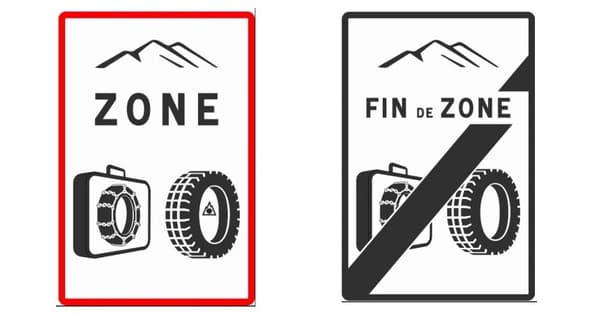From this Tuesday, November 1 and until March 31, 2023, it will be mandatory to place winter tires (or compatible 4 seasons) or have removable equipment in the trunk for motorists who will travel through the roads of 34 departments.
Mandatory but not (yet) verbalizable
A consequence of the Mountain Law, which has been in force since last year from November 1 to March 31. After a tolerance period for the first winter season 2021-2022 with this obligation to be equipped, however, no verbalization will be possible again this year.
Clearly, there is no fine for lack of winter material, at least until December 31, as confirmed by the Ministry of Transport in CMRas a result of what Road Safety told us a little earlier.
If therefore you do not run the risk of being fined 135 euros and the possible immobilization of the vehicle, Road Safety recalls the interest of equipping yourself to “reinforce the safety of users by reducing the specific risks associated with driving on snowy or icy roads “. “. And also to avoid a common scene: the traffic jams that form when approaching the stations with, originally, motorists poorly equipped to drive through the snow.
A risk in the event of an accident without equipment
In the event of an accident in an area in question without being equipped, your insurer could also refuse to compensate you. The obligation is applied in effect, even without verbalization in force.
“Insurance may not cover damage if the vehicle is not equipped with approved tires or chain in the event of an accident,” explained a spokesperson for neoinsurer Leocare.
An insurance company that also recalls the various causes that can lead to the cancellation or reduction of the compensation of a claim: due to false voluntary declaration of the insured, due to negligence or recklessness of the insured, or if the insured was under the influence of alcohol or narcotics (in the latter case, only damages suffered by third parties will be covered).
But how to check whether or not the motorist had removable equipment in his trunk? “When declaring a claim, the insured is obliged to send us the details of his claim, with supporting photos. The appraisal or tele-appraisal (remote appraisal) can help contextualize the claim and determine whether or not the insured had the required equipment”, Christophe Dandois, co-founder of Leocare, tells us.
Macif, for his part, is quite reassuring, highlighting his effort to warn motorists of the risks and underlining a priori coverage maintained:
“On this subject, our role is therefore to help the member to comply with this legislation in our prevention and information actions and to inform him of the risks he incurs. In the event of an accident, the member is insured up to the limit of your contract, whether or not it is equipped with winter tires”, specifies the insurer.
Temperatures too high, what to do?
Another scenario that comes up a lot in the comments this year: the very mild temperatures this fall, which do not justify putting on winter tires from November 1 at all.
“The measurement is good. The application on a fixed date is not. Currently, it is 15 to 20° in most regions of France. It is clear that it is not now that I will mount my winter tires. We will see when it will be permanently less than 10° during the day,” testifies an inhabitant of a mountainous area.

It is also not advisable to use a winter tire at a temperature above 7°C, which calls into question the obligation to mount them to improve safety from November 1:
“Above 7°C, winter tires perform less well than summer tyres, particularly in terms of braking distances, (…) the tread rubber of a winter tire softens and loses efficiency”, recalls Michelin on a dedicated page, also referring to excessive fuel consumption.
Logically, it would therefore be necessary to establish the start date of this winter period each year depending on the meteorological context. This is also the case in Germany, which does not have a fixed period for the obligation to fit winter tyres. In France, Road Safety, dependent on the Ministry of the Interior, has not been able to tell us if an evolution of the Mountain Law was planned at this point.
In the event of a claim, without being equipped and in the affected area, from November 1 but without winter conditions, the insurer must in any case show discernment.
“Claim management is detailed and takes into account the global context of the accident. If during the claim the adjuster indicates that there is no correlation between the cause of the accident and the non-use of winter tires, due to mild weather, this point will not be raised”, emphasizes Christophe Dandois from Leocare.
In case of doubt, do not hesitate to contact your insurer or leave with at least detachable equipment on board.
Source: BFM TV

